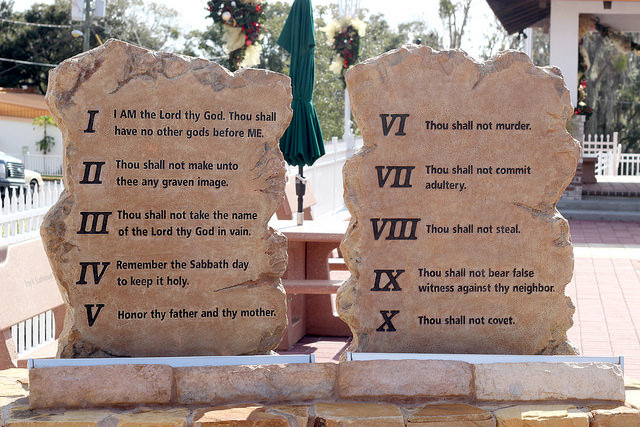
Thou shalt not kill, thou shalt not steal, thou shall not bear false witness. These commandments have been echoed in the collective consciousness of Christians for centuries. Although many people, religious and atheist, are familiar with Christianity’s Ten Commandments, a new survey indicates that fewer religious people hold them in high esteem. The survey included a thousand Americans and another thousand in the United Kingdom and asked them to decide if each of the commandments was an important principle to live by, no longer important as a principle, or to indicate whether they were unsure. According to the results from Deseret News, not all of the Ten Commandments are viewed as a vital part of being a morally righteous person.
We Don’t Take The Ten Commandments Seriously[/tweetthis]
The most significant commandments which forbid murder, theft, and bearing false witness are still seen as important. According to the survey, over 90 percent of people interviewed believed that these commandments were necessary principles to live by. The most likely reason that these commandments are believed to be sacred is that they are not specific to any particular religion; most faiths and secular individuals can find common ground in preventing murder, theft, and lying. However, the same willingness to abide by the commandments begins to dissipate when the commandments become more specific to Christianity.
The Ten Commandments regarding honoring one’s mother and father, not committing adultery, and coveting another’s possessions appear to have a tendency to be favored by the survey’s respondents. Still, the respondents did not agree to the same extent as they did with murder, theft, and lying. While these commandments are still accepted, their necessity appears to be waning.
The final four commandments that are more unique to Christianity are becoming more acceptable to disregard in the eyes of Christians, especially in the age group of 18-29. According to the poll, the worship of other gods, worshipping idols, and using the Lord’s name in vain is only seen as valuable in about 60% of the American respondents and 31% or fewer in the United Kingdom’s respondents. These numbers fall drastically for both groups when the final commandment, keeping the Sabbath holy, is considered. Fewer than 50% of Americans and only 19% of U.K respondents found this to be an important commandment.
There are many possible explanations for this change in religious mindset towards the Ten Commandments. Primarily, it seems that there has been an increase in secularization in both the United States and the United Kingdom, reducing the number of people who follow the beliefs. Those who are atheist or lapsed in their faith would see the value in not killing or stealing, but keeping the Sabbath holy would not be important. Another possibility is that the concept of morality is evolving, making new lines between what each generation would consider morally correct. As a result, the influence of the Ten Commandments could be changing from absolute rules into something of moral guidelines that are interpreted by the individual rather than being cemented into the public mindset as they were in the past.
